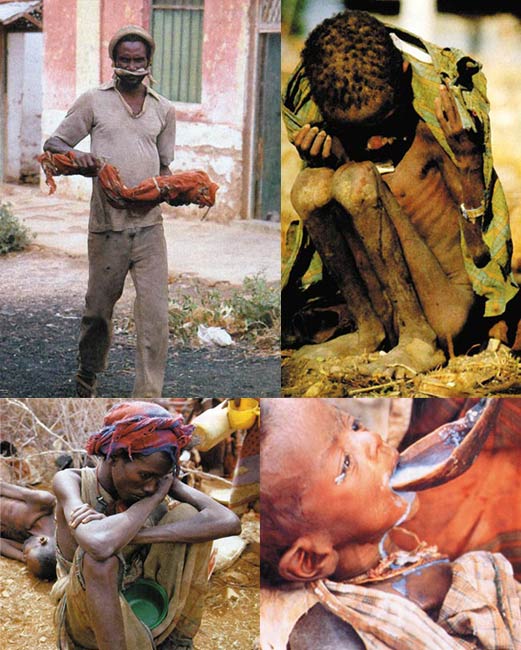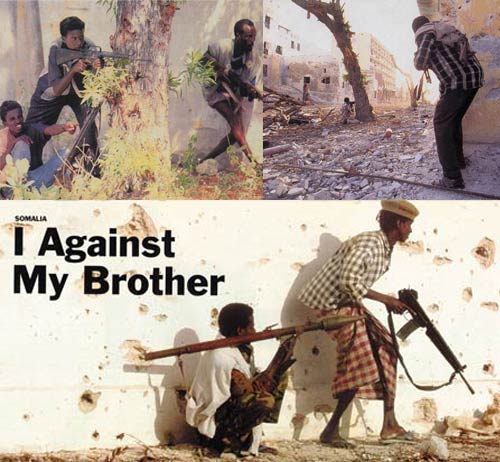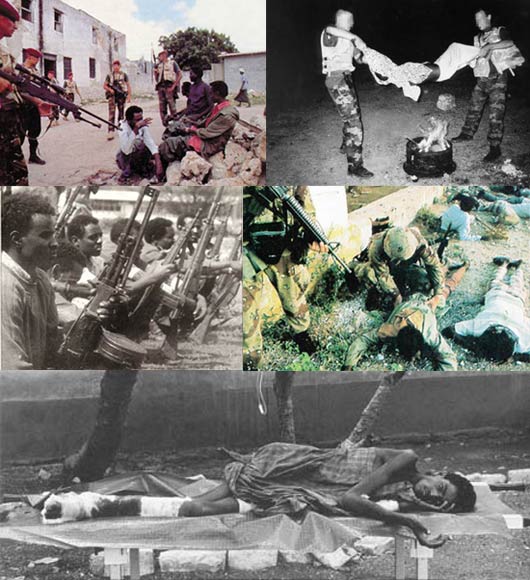 |
Whenever Somalia is mentioned, most people think of a familiar list of terrible calamities gleaned from newspapers or television reports: famines suffered by millions, epidemics such as cholera, drought, civil conflict, tribal wars, political instability – all these ills are part of the daily lives of the Somali people. Aid from humanitarian organizations is far from resolving the terrible situation facing the people of the country, and only offers short-term relief. The political interventions made on the pretext of re-establishing peace and security actually only serve to increase the and conflict.
The fundamental cause of the in Somalia goes back to the days of colonialism. Somalia first encountered Islam when Muslims migrated to Abyssinia in order to be protected from the idola-ters in Mecca. It was colonized by the British in the nineteenth century. After that period the Somalis were condemned to never-ending wars, conflict, famine and disease. In 1884, the British occupied northern Somalia, and the Italians the south in 1887, and as in so many other Muslim countries, this ushered in a period of great cruelty and oppression.
Following a long period of colonialism, Somalia became independent in 1960, and Aden Abdullah was made president. However, the establishment of a just and stable administration in Somalia was not permitted. Gen. Mohammed Siad Barre took over the country in a military coup in 1969, and all political parties were closed down. Barre saw Muslims as the major obstacle to the socialist order he hoped to impose, and so he banned all Islamic books, magazines and newspapers. Numerous Muslim intellectuals and scholars who opposed this policy were executed on his orders.
 |
Barre fled the country when fighting broke out in the country in 1991, and there followed a huge civil war. One million or so mainly Muslim Somalis were forced to migrate to a number of other African countries.
Under a 1992 United Nations General Assembly resolution, 30,000 U. N. troops under United States command set up a base in the country. The United Nations came in for intense popular protest from the native population, and had to withdraw from the country in 1994. They left more than 7,000 dead behind them, and an even worse state of in Somalia.
Today, the civil war between various domestic tribes continues by a number of means, and people are still dying every day. The worst problem facing this country of some 8 million people is hunger and poverty. According to the U.N. Food and Agriculture Organization (FAO) report for 2000, 75 percent of Somalis are malnourished, and the endless floods affecting the country are bringing it to the brink of a terrible famine.
It must not be forgotten that contrary to general world opinion, the problem of hunger is not an insuperable one. A fair distribution of world resources, the technological resources of wealthy nations being placed at the service of the whole world, and preventing wasteful use of surplus production to instead use it for aid purposes are only a few of the things that could be done. However, what lies behind the failure to find a solution to problems such as hunger and disease in our day is again moral deficiencies such as selfishness, overbearing personal interests, greed and apathy.
Famine on One Hand … |
 |
| Famine, epidemics of diseases such as cholera, drought, internal conflict, tribal wars and political instability suffered by millions of people have become a normal part of daily life in Somalia. The help provided by humanitarian aid organizations is far from resolving the people's difficulties, offering nothing more than a stopgap measure. Fully 75 percent of Somalis suffer from malnutrition. |
… Civil War on The Other |
 |
… And UN Aid |
 |
| UN troops who went to take aid to Somalia turned over time into despots, opening fire on the populace and torturing them. The Somali people lost all faith in the foreign troops who attacked them instead of lending a helping hand. |
The atheist culture that dominates the world today drives people towards selfishness instead of sacrifice and striving to help others. This culture produces excessive poverty and excessive wealth in both individual societies and in the world in general. In the Qur'an Allah describes the kind of people who do not feed the hungry and needy in these terms:
Have you seen him who denies the religion? He is the one who harshly rebuffs the orphan and does not urge the feeding of the poor. (Surat al-Ma'un: 1-3)
For that reason, the salvation of the world lies not in those who deny religion, but in government by people who sincerely believe in religion and rule accordingly. If Islam can grow stronger and come to prevail in the world, this will be the salvation not just of oppressed Muslims, but of all oppressed people in the world.